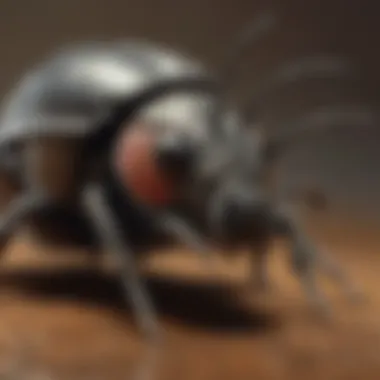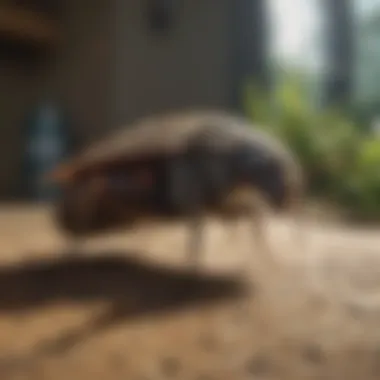Mastering Family Pest Control: A Comprehensive Guide for a Pest-Free Home


Preventive Pest Control Strategies
Household pests can be a persistent nuisance, infiltrating our living spaces and posing various health risks. To combat these unwelcome intruders, implementing preventive pest control strategies is key. One crucial aspect is ensuring the protection of your house exterior. By sealing cracks effectively, clearing debris, and employing methods to prevent pests from entering, you create a strong barrier against potential infestations. Furthermore, maintaining yard cleanliness is vital. Engaging in essential yard care routines and adopting methods to keep your yard pest-free not only enhances the aesthetic appeal of your outdoor space but also minimizes the attractiveness of your property to pests.
When it comes to indoor spaces, cleanliness is paramount in pest prevention. Expert cleaning tips and techniques play a significant role in deterring pests from finding refuge within your home. Additionally, proper garbage disposal cannot be understated. By adhering to efficient waste disposal methods and understanding the importance of disposing of garbage properly, you eliminate potential food sources for pests. Exploring innovative ways to safeguard your home by combining various prevention strategies ensures a comprehensive approach to family pest control.
Introduction
In this comprehensive guide to family pest control, it is essential to grasp the significance of safeguarding your home and loved ones from potential infestations. Family pest control goes beyond the mere annoyance of creepy crawlies; it is about ensuring a safe and healthy environment for everyone residing in the household. By understanding the threats posed by common household pests and implementing effective preventive measures, families can enjoy peace of mind knowing that their living spaces are free from these unwanted invaders.
Understanding the Importance of Family Pest Control
Health Risks Associated with Pests
One of the critical aspects of family pest control is addressing the myriad health risks associated with pests. Pests can carry and transmit various diseases, posing a significant threat to human health. From allergens causing respiratory issues to pathogens causing foodborne illnesses, pests can compromise the well-being of individuals within the household. Identifying and eliminating these health risks through effective pest control measures is paramount to ensuring a healthy living environment for the family.
Damage to Property and Possessions
Another crucial consideration in family pest control is the potential damage pests can inflict on property and possessions. Whether it's rodents gnawing through wires, termites feasting on wooden structures, or bed bugs infesting furniture, pests can cause extensive damage that is not only financially burdensome but also emotionally distressing. By recognizing and addressing such risks promptly, families can protect their investments and preserve the integrity of their living spaces.
Impact on Mental Well-being
Beyond the tangible harms, pests can also have a profound impact on the mental well-being of individuals. The constant stress and anxiety caused by dealing with pest infestations can take a toll on one's mental health, leading to increased tension and disrupted peace of mind. By proactively managing and eradicating pests, families can alleviate the mental burdens associated with living in an infested environment, promoting a sense of security and tranquility.
Common Household Pests
When it comes to common household pests, a variety of nuisances can infiltrate homes and create problems for residents. Understanding the characteristics and behaviors of each pest is crucial for effective pest management.
Cockroaches
Cockroaches are notorious for their resilience and ability to spread disease. These unsightly insects can contaminate food, surfaces, and utensils, posing a significant health risk to inhabitants. Implementing stringent control measures is vital to eliminate cockroach infestations and maintain a hygienic living environment for the family.
Ants


Ants may seem harmless, but their colonies can quickly grow out of control, leading to food contamination and structural damage. By addressing ant infestations promptly and implementing preventive strategies, families can prevent these pests from becoming a nuisance in their homes.
Rodents
Rodents such as mice and rats are not only destructive but also carry diseases that can endanger human health. Their gnawing habits can cause damage to property, while their presence can instill fear and discomfort in residents. Proper rodent control methods are essential to safeguarding the home and well-being of the family.
Bed Bugs
Bed bugs are notorious for their nocturnal feeding habits, causing itchy bites and sleep disturbances for individuals sharing living spaces with these pests. Prompt identification and treatment of bed bug infestations are crucial to preventing their spread and minimizing the discomfort experienced by household members.
Termites
Termites are silent destroyers that can wreak havoc on the structural integrity of homes. Their voracious appetite for wood can lead to costly repairs and compromises in the safety of the dwelling. Implementing termite prevention strategies and promptly addressing infestations are vital for preserving the integrity of the property.
Spiders
While most household spiders are harmless, some species can deliver venomous bites that pose risks to human health. Maintaining a spider-free environment through effective pest control measures is essential for reducing the likelihood of encounters with venomous spiders and ensuring the safety of family members.
Preventive Measures
Family pest control necessitates a proactive approach to minimize the risk of infestations and ensure a safe environment for your loved ones. Preventive measures serve as the cornerstone of this comprehensive guide, acting as a shield against potential pest invasions. By implementing these strategies, you can significantly reduce the chances of encountering pest-related issues in your home. From cleanliness practices to sealing entry points, each measure plays a vital role in safeguarding your family from the nuisance of pests.
Maintaining Cleanliness and Hygiene
Regular Cleaning Practices
Regular cleaning practices are pivotal in preventing pest infestations by eliminating factors that attract pests. Consistent cleaning not only removes food residues but also reduces hiding spots for pests, disrupting their breeding and foraging patterns. This crucial aspect of cleanliness ensures that your home remains unappealing to pests, serving as a fundamental defense mechanism against unwelcome intruders.
Proper Waste Management
A fundamental component of maintaining cleanliness, proper waste management is essential in deterring pests. By disposing of trash promptly and storing waste in sealed containers, you eliminate potential food sources for pests. This practice not only curtails pest access to sustenance but also contributes to overall sanitation, promoting a pest-free household environment.
Sealing Entry Points
Identifying Vulnerable Areas


Identifying vulnerable areas in your home is paramount to prevent pest infiltration. These areas, such as gaps in doors and windows, serve as common entry points for pests. By recognizing and sealing off these vulnerable spots, you create a barrier that impedes pest access, effectively fortifying your home against potential infestations.
Using Sealants and Screens
Utilizing sealants and screens provides an additional layer of protection against pests attempting to enter your home. Sealants act as barriers, closing off cracks and crevices that could serve as pathways for pests. Screens on windows and vents prevent pests from entering while allowing air circulation, maintaining a balance between protection and functionality.
Storage Practices
Sealed Containers for Food
Store food items in sealed containers to prevent pests from contaminating or accessing them. Sealed containers deter pests like ants and rodents, safeguarding your pantry staples from infestation. This practice not only maintains food quality and hygiene but also diminishes the likelihood of attracting pests to your kitchen.
Clothing Storage
Proper clothing storage is essential for deterring fabric pests like moths and carpet beetles. Opt for airtight containers or garment bags to protect clothing items from damage and infestation. By implementing suitable storage solutions, you ensure that your clothes remain intact and pest-free, prolonging their durability and quality.
Natural Pest Control Methods
In the realm of family pest control, incorporating natural methods is crucial for those seeking environmentally-friendly and safe solutions for pest management. Natural pest control methods offer a sustainable approach that reduces the reliance on harsh chemicals and pesticides, making them ideal for families looking to protect their loved ones and pets.
Essential Oils and Plant-Based Solutions
Lavender Oil
Lavender oil stands out as a popular choice in natural pest control due to its aromatic properties that act as a deterrent for various pests. The key characteristic of lavender oil lies in its ability to repel insects such as mosquitoes, flies, and moths while providing a pleasant scent in the household. The unique feature of lavender oil is its calming effect on humans, making it a dual-purpose solution. However, one should be cautious with lavender oil around pets, as it can be toxic to them in certain concentrations. Overall, lavender oil is a versatile and effective option for natural pest control in a family setting.
Peppermint Oil
Peppermint oil is another powerful player in natural pest control, known for its strong scent that repels common household pests like ants, spiders, and mice. The key characteristic of peppermint oil is its ability to disrupt the insects' senses, driving them away from treated areas. Its invigorating fragrance also makes it a popular choice for those looking to maintain a fresh and pest-free home environment. However, excessive use of peppermint oil can be overpowering, so moderation is key when applying this solution. Despite its potent scent, peppermint oil is a safe and effective natural alternative to chemical pesticides.
Neem Oil
When it comes to natural pest control, neem oil is heralded for its insecticidal properties that target a wide range of pests including aphids, mealybugs, and caterpillars. The key characteristic of neem oil lies in its ability to disrupt the pests' hormonal balance, impeding their development and reproduction. This makes it a sustainable and eco-friendly choice for households concerned about the impact of traditional pesticides on the environment. While neem oil is effective against pests, it can have a strong odor that may not be appealing to all family members. Overall, neem oil offers a biopesticide solution that is safe, effective, and environmentally conscious.


Professional Pest Control Services
In the realm of family pest control, the utilization of professional pest control services plays a pivotal role in maintaining a healthy and pest-free environment. Professional pest control services offer specialized knowledge and expertise that are essential in effectively eradicating pests from your home. By entrusting the task to trained professionals, you can ensure thorough and long-lasting solutions that safeguard your family's well-being.
When to Seek Professional Help
Persistent Infestations
Persistent infestations present a significant challenge in the battle against pests, indicating a severe and ongoing issue within your household. These infestations, characterized by their continuous presence despite repeated interventions, demand the attention of professional pest control services. The key characteristic of persistent infestations is their resilience, often making them a recurring problem in the absence of professional assistance. While persistent infestations require targeted and sustained treatment, their identification allows for timely intervention to prevent further escalation of the pest problem.
Complex Pest Species
Complex pest species pose a unique set of challenges due to their specialized biology and behavior, necessitating skilled intervention from professional pest control services. These pests, which may include species with intricate nesting habits or resistant to common eradication methods, require expert handling to effectively eliminate them from your home. The distinctive feature of complex pest species lies in their adaptability and ability to evade traditional pest control measures, underscoring the importance of engaging professionals with the knowledge and resources to address such intricacies.
Choosing the Right Pest Control Company
When selecting a pest control company, certain criteria can guide your decision-making process to ensure optimal outcomes for your pest control needs.
Certifications and Licenses
Certifications and licenses serve as indicators of a pest control company's credibility and adherence to industry standards. Companies that hold relevant certifications demonstrate a commitment to professionalism and quality service, reassuring homeowners of the company's competency in dealing with diverse pest issues. While certifications validate a company's expertise, licenses ensure compliance with regulations, offering homeowners peace of mind regarding the legality and reliability of the service provider.
Eco-friendly Practices
Embracing eco-friendly pest control practices not only aligns with sustainable living principles but also promotes a safer environment for your family and pets. Pest control companies that prioritize eco-friendly practices utilize non-toxic methods and products that minimize environmental impact while effectively managing pest populations. The unique feature of eco-friendly practices lies in their ability to deliver targeted pest control solutions without compromising the health of occupants or the ecosystem. By opting for eco-friendly pest control, homeowners can achieve a harmonious balance between pest management and environmental stewardship.
Conclusion
In the realm of family pest control, maintaining a pest-free home is not just a matter of convenience; it is crucial for the well-being and safety of your family. Consistent monitoring and maintenance play a pivotal role in ensuring that your household remains free from unwanted pests. By regularly inspecting your property for any signs of infestation and promptly addressing any issues that arise, you can effectively prevent small problems from escalating into full-blown pest crises. This proactive approach not only saves you time and money in the long run but also provides peace of mind knowing that your home is a healthy environment for your loved ones.
Education and awareness are equally essential in the battle against household pests. By understanding the behaviors and habitats of common pests, you can proactively implement measures to deter them from invading your space. Educating yourself on the warning signs of infestations and enlisting the help of pest control professionals when needed are key components of a comprehensive pest management strategy. Furthermore, raising awareness among your family members about the importance of cleanliness, proper food storage, and maintenance practices can help prevent future pest problems and promote a harmonious living environment.
Maintaining a Pest-free Home
Consistent Monitoring and Maintenance
Consistent monitoring and maintenance are the backbone of a successful pest control strategy. By regularly inspecting your home for signs of pest activity, such as droppings, chew marks, or unusual smells, you can quickly identify and address any potential issues before they escalate. Implementing routine maintenance tasks, such as sealing cracks and crevices, repairing leaky pipes, and keeping outdoor spaces tidy, can also help prevent pests from gaining access to your home. Consistency is key when it comes to monitoring and maintenance, as regular upkeep is essential for long-term pest prevention.
Education and Awareness
Education and awareness are powerful tools in the fight against household pests. By educating yourself about the habits and behaviors of common pests, you can better understand how to keep them at bay. Awareness of potential entry points, such as gaps in doors and windows or openings around utility lines, can help you fortify your home against unwanted invaders. Teaching your family members about the importance of good hygiene practices, proper food storage, and timely repairs can also contribute to a pest-free environment. Additionally, staying informed about the latest pest control techniques and technologies can empower you to make educated decisions about protecting your home and family.



